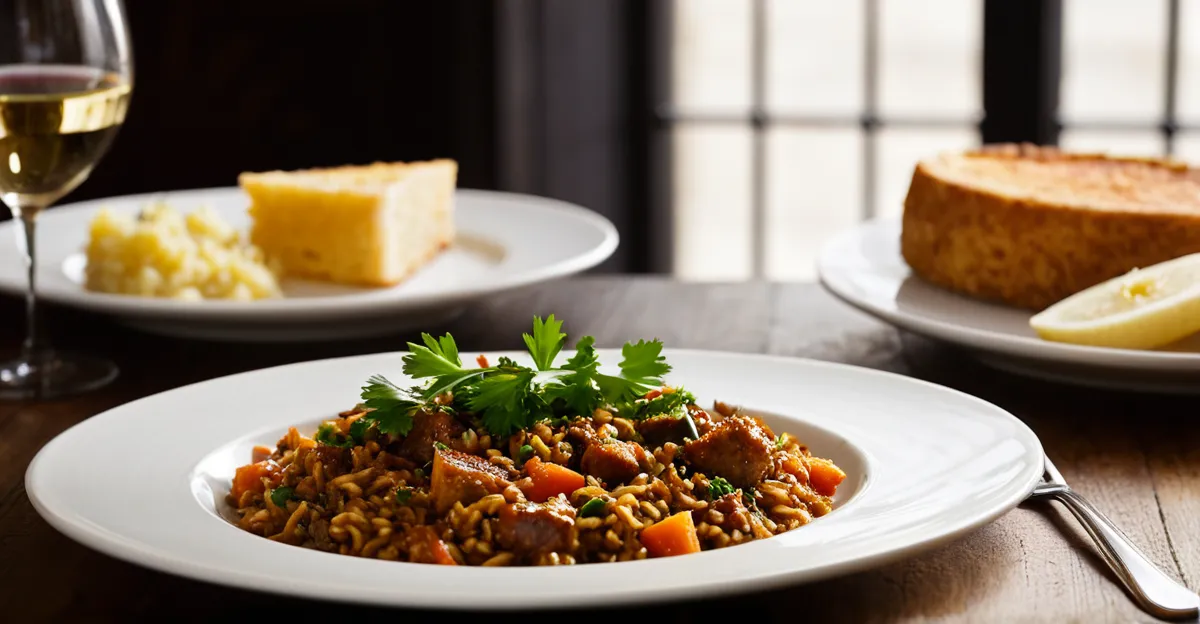Healthier Ingredient Swaps for Classic UK Dishes
Small changes can bring big health benefits.
Many traditional British recipes rely heavily on ingredients high in fats, sodium, and refined carbohydrates. To improve these dishes, consider healthy ingredient substitutions that maintain taste while enhancing nutrition. One effective approach is replacing refined grains with whole grains. For example, swapping white bread for wholemeal options adds fiber and nutrients, aiding digestion and heart health.
Also read : How do you achieve the perfect balance in a classic bangers and mash?
Choosing lower-fat alternatives is another key strategy. Using low-fat dairy products like skimmed milk or reduced-fat cheese reduces saturated fat intake without compromising creaminess in recipes like cheesy casseroles. Lean meats such as skinless chicken or turkey can substitute fatty cuts in iconic dishes like shepherd’s pie, cutting unhealthy fats significantly.
Plant-based options also offer promising alternatives. Incorporating legumes or tofu can provide protein while lowering saturated fat. These healthy ingredient substitutions often alter texture slightly, but clever seasoning and cooking techniques help preserve traditional flavours. With thoughtful swaps, classic dishes become more nutritious and accessible for health-conscious cooks.
This might interest you : What are the best techniques for a flaky beef Wellington?
Smart Cooking Techniques for Healthier Results
Choosing the right alternative cooking methods is crucial for preparing healthier British meals. Instead of frying, techniques like baking, grilling, poaching, and steaming reduce fat content significantly while preserving nutrients. For example, baking fish or roasting vegetables requires less oil than deep frying, lowering overall calorie intake and saturated fat levels without sacrificing texture or taste.
Reducing oil usage and selecting healthier fats such as olive or rapeseed oil further improve meal nutrition. These oils provide beneficial unsaturated fats and contribute subtle, pleasant flavours. The key is to use fats sparingly and avoid trans fats, which are common in some processed foods and traditional frying oils.
To maintain authentic tastes in healthy British cooking, herbs, spices, and marinades are indispensable. Fresh herbs like thyme or rosemary complement grilled meats, while spices such as paprika add depth without added salt or fat. Marinades with lemon juice, garlic, and mustard not only tenderize food but also enhance flavour, allowing for reduced reliance on less healthy ingredients. This combination of smart cooking techniques supports delicious, nutritious versions of time-honoured dishes.
Modifying Iconic Recipes With Health in Mind
Modifying iconic UK dishes like shepherd’s pie and fish and chips requires focused recipe modification to reduce calories and improve nutrition without losing traditional appeal. How can one adapt these favourites for better health? By incorporating healthy UK classics principles: using lean minced meat instead of fatty cuts in shepherd’s pie cuts saturated fat, while adding extra vegetables boosts fiber and vitamins. Replacing mashed potato with sweet potato mash increases antioxidants and adds natural sweetness, reducing the need for added fats.
For fish and chips, oven-baking instead of deep frying cuts calorie intake dramatically. Using wholemeal breadcrumbs in place of white provides additional fiber and nutrients. These swaps maintain crisp textures and flavour, key to authenticity.
What key impacts arise from such recipe modification? Reduced saturated fat and calorie counts support heart health and weight management, while increased vegetable content enhances overall nutrition. The clever combination of lean protein, whole grains, and vegetables ensures meals remain satisfying and familiar. This approach demonstrates that with thoughtful adjustments, classic British dishes can be transformed into healthier options without compromising tradition or enjoyment.
Nutritional Comparison: Traditional vs Healthier Versions
Understanding the nutritional differences between traditional British recipes and their healthier counterparts helps demonstrate the clear benefits of making swaps. Nutritional analysis shows that classic dishes often contain high calorie counts and excessive amounts of saturated fat. For instance, traditional shepherd’s pie made with fatty minced meat and buttery mashed potatoes can pack a substantial calorie load and saturated fat content.
In contrast, healthier recipe modification—such as using lean meat and sweet potato mash—can reduce calories and saturated fat significantly. Similarly, traditional fish and chips’ deep-frying contributes to excessive fat, whereas oven-baked versions with wholemeal breadcrumbs lower calorie intake while adding fiber.
Comparing these versions side-by-side reveals consistent reductions in saturated fat and calories, which support heart health and weight management. Lower sodium levels often accompany ingredient substitutions, further benefiting overall wellness. This evidence-based nutritional analysis clearly encourages healthy ingredient substitutions and healthy UK classics to deliver meals that remain deeply satisfying with improved health profiles. The measurable differences underscore how thoughtful recipe adjustments make traditional favourites practical for today’s health-conscious kitchens.





